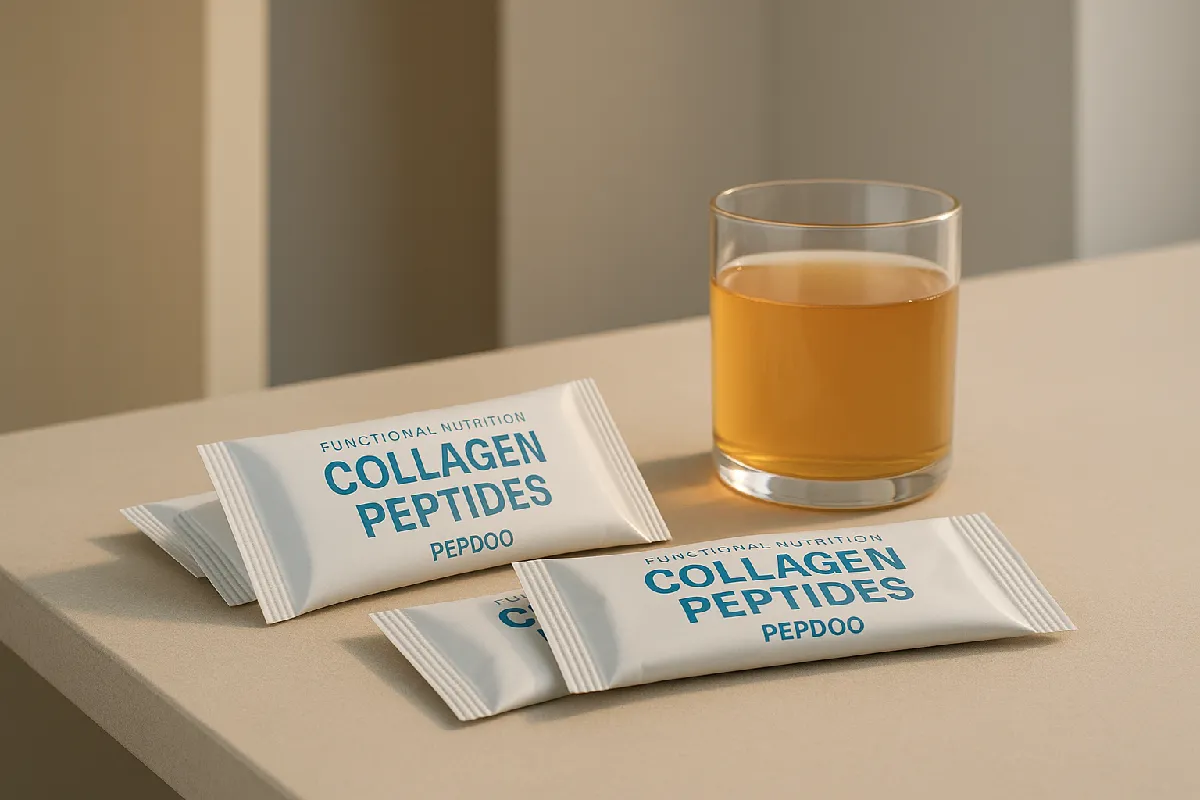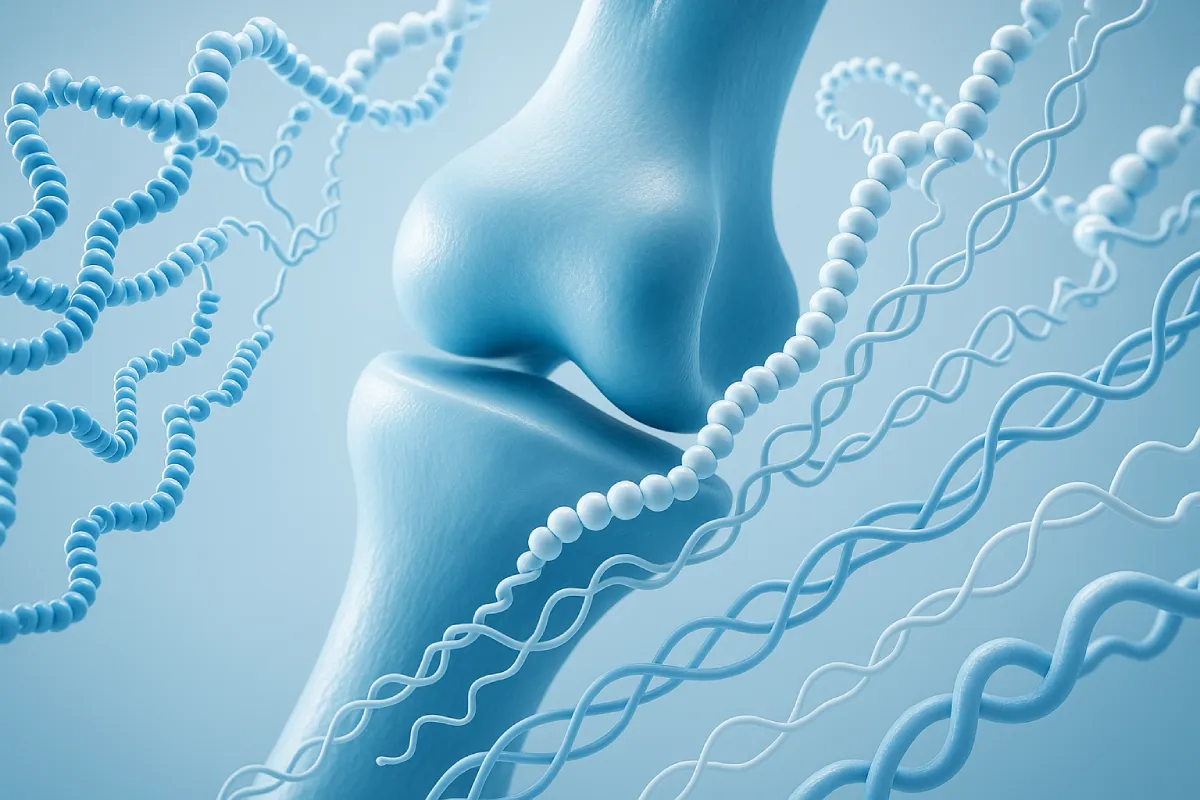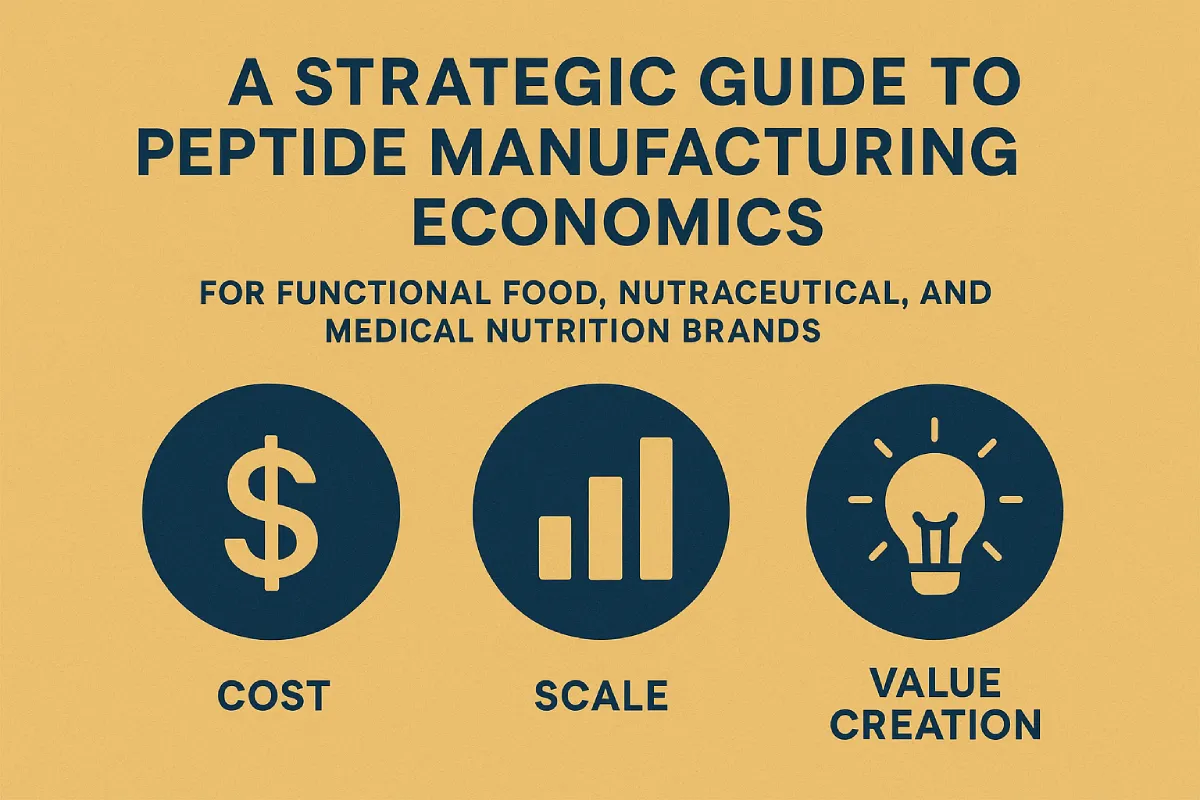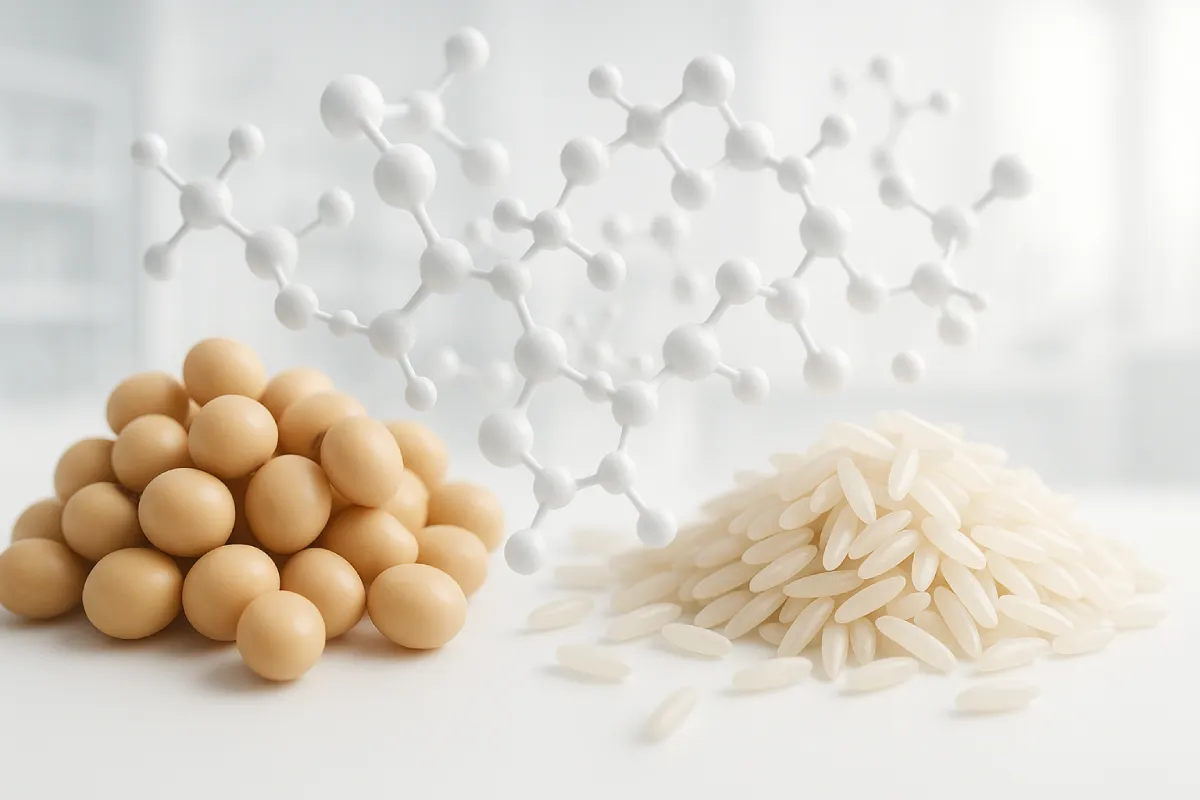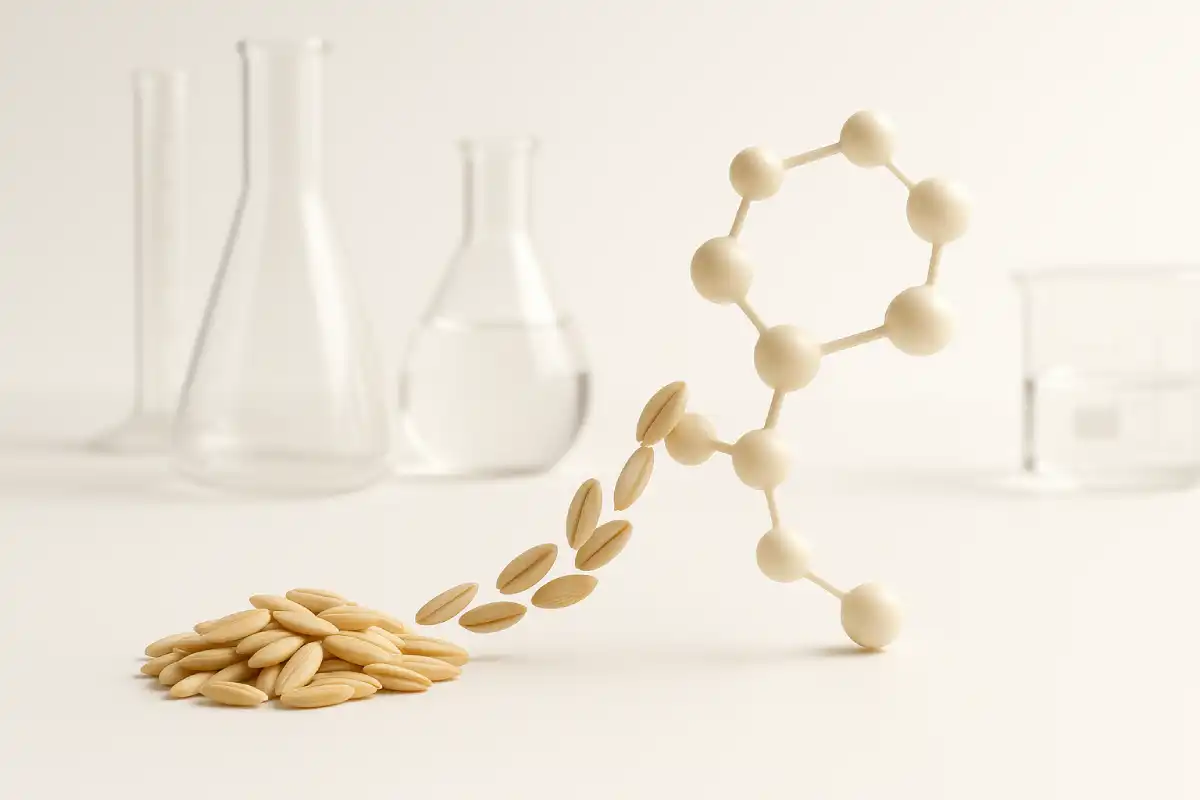A New Era for RTD: Wellness, Convenience, and Beyond
As consumers demand more from what they drink—seeking wellness, convenience, and clean-label ingredients—the ready-to-drink (RTD) beverage category is undergoing a significant transformation. No longer limited to sugary sodas or simple hydration products, the market is shifting toward functionally enriched drinks, with bioactive peptides gaining traction as next-generation ingredients. For beverage formulators, brand developers, and ingredient buyers, this evolution presents both an opportunity and a formulation challenge.
Why Functional Peptides Are Taking the Spotlight
Functional peptides are short chains of amino acids derived from natural proteins through enzymatic hydrolysis. Unlike whole proteins, peptides are easier to digest, often more bioavailable, and can exert targeted biological functions, such as immune modulation, antioxidant defense, muscle repair, and skin rejuvenation [1].
From a scientific and formulation perspective, peptides offer distinct advantages over other bioactives:
- Fast absorption due to low molecular weight
- Specific physiological roles supported by clinical data
- Compatibility with other functional ingredients
These features make peptides attractive for RTD beverages aiming to deliver specific health benefits—from beauty-from-within concepts to sports recovery and cognitive support.
RTD Market Dynamics: The Functional Shift
The global RTD beverage market is expected to exceed USD 160 billion by 2026, driven by changing consumer lifestyles and increased interest in health and wellness [2]. Within this booming category, protein and peptide-enriched drinks are among the fastest-growing segments.
Three major trends are accelerating the adoption of peptides in beverages:
- Convenient Wellness: Consumers want health benefits in portable, easy-to-consume formats. RTDs with collagen peptides, casein peptides, or plant-based peptides check all the boxes.
- Ingredient Transparency: Clean-label trends are pushing brands to use ingredients that are natural, traceable, and efficacious.
- Targeted Functionality: Unlike generic protein, peptides allow brands to develop differentiated claims, such as “supports joint health,” “improves skin elasticity,” or “enhances endurance.”
Leading brands like Vital Proteins, Shiseido, and Nestlé have already introduced peptide-enriched beverage formats, reflecting growing industry validation.
Popular Peptides in RTD Applications
| Peptide Type | Key Benefit | Common Applications |
|---|---|---|
| Collagen peptides | Skin health, joint support | Beauty drinks, bone broth RTDs |
| Casein peptides | Muscle recovery, satiety | Sports shakes, protein drinks |
| Soy peptides | Cardiovascular support, anti-fatigue | Plant-based wellness beverages |
| Pea peptides | Muscle building, weight management | Vegan RTDs, metabolic boosters |
| Fish peptides | Anti-aging, antioxidant defense | Marine collagen drinks, beauty RTDs |
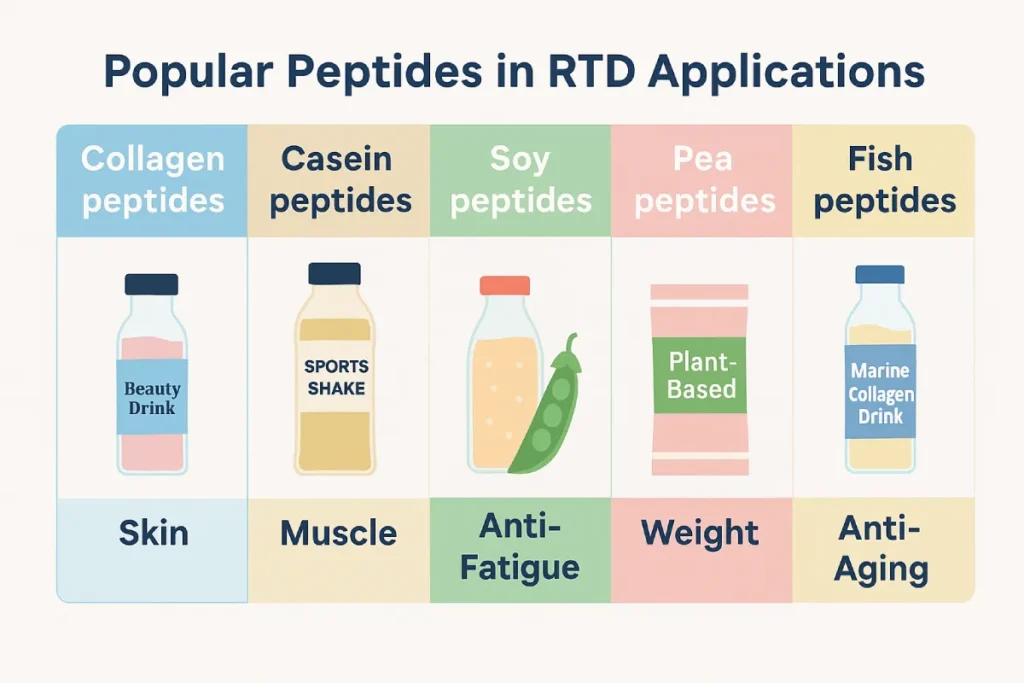
Formulation Challenges in Peptide-Infused RTDs
Despite their benefits, incorporating peptides into RTD beverages is not without its hurdles. Key formulation issues include:
1. Taste & Mouthfeel
Many peptides, especially from animal sources, carry a slightly bitter or umami note. This can impact the flavor profile of a drink. Solutions include:
- Flavor masking agents
- pH adjustment
- Microencapsulation to reduce off-tastes
2. Stability in Liquid Systems
Peptides may degrade under certain processing conditions such as:
- High temperatures during pasteurization or UHT
- Low pH in acidic beverages
- Exposure to oxygen or light
To ensure shelf stability, manufacturers often employ spray-dried peptide powders with proven solubility and stability data.
3. Interaction with Other Ingredients
Peptides may interact with minerals, vitamins, or emulsifiers, affecting clarity, color, or viscosity. Formulators must conduct compatibility testing to ensure visual appeal and functional performance over time.
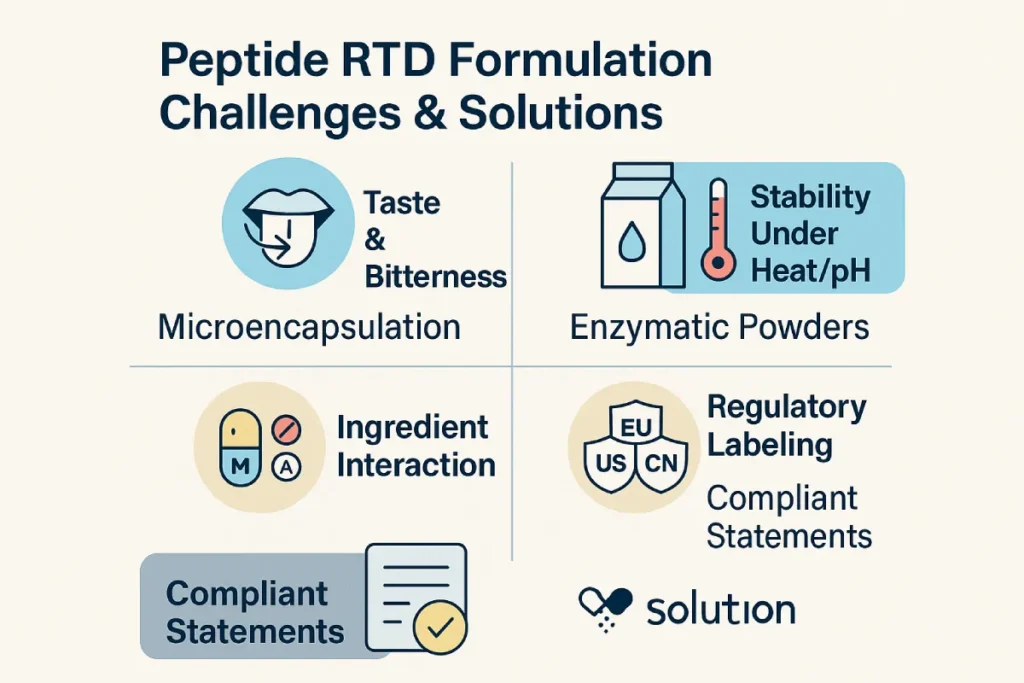
Clean-Label and Regulatory Considerations
As peptides move into the mainstream, clean-label compliance is becoming more critical. Beverage brands must ensure:
- Transparent labeling: Clearly stating peptide source (e.g., “hydrolyzed fish collagen”) builds trust.
- Non-GMO and allergen-free claims: Particularly important for soy, milk, or egg-derived peptides.
- Regulatory alignment: In the U.S., peptides are typically categorized as dietary ingredients. In the EU, they fall under novel food or protein hydrolysate categories. Asia-Pacific markets vary but often require detailed documentation and functional substantiation [3].
Importantly, any health claims must be backed by scientific data and comply with local food labeling regulations.
The Future of Peptide-Enriched RTDs
The future of peptide beverages is moving beyond single-function products to multi-functional, personalized nutrition. We are seeing several innovation directions:
- Hybrid Formulas: Combining peptides with hyaluronic acid, probiotics, nootropics, or adaptogens.
- Plant-Based Peptides: For vegan and flexitarian consumers, pea and rice peptides are gaining ground.
- Format Innovation: Powdered sticks, nano-emulsified shots, and resealable mini-bottles are improving portability and dosing accuracy.
- Data-Driven Formulation: Personalized peptide blends based on genetic or lifestyle data are becoming feasible thanks to AI-driven platforms.
Choosing the Right Peptide Partner for Beverage Innovation
To successfully develop a peptide-based RTD product, beverage brands should look for a raw material partner that offers:
- Full-process manufacturing: From enzymatic hydrolysis to spray drying and QA testing
- Application expertise: Including RTD-specific solubility, stability, and flavor masking strategies
- Regulatory support: Including COA, MSDS, technical dossiers, and label compliance guidance
- Customization: Ability to provide tailored peptide blends or encapsulation formats
PEPDOO® is a leading global peptide supplier that supports RTD innovation from concept to launch. With over 6,000 MT of annual capacity and in-house formulation capabilities, we help brands translate functional peptide science into scalable, beverage-ready solutions.
Conclusion
Functional peptides represent a powerful tool in the evolution of the RTD beverage industry. Their ability to deliver targeted benefits in compact, convenient formats aligns with key market trends—from clean-label demand to personalized wellness.
However, achieving success in this space requires more than choosing a trendy ingredient. It involves scientific understanding, technical formulation, regulatory know-how, and the right supply chain partner.
For beverage brands ready to ride the next wave of functional innovation, peptide-enriched RTDs offer the ideal fusion of efficacy and experience.
Ready to Develop Your Peptide-Enriched Beverage?
Partner with PEPDOO® to access stable, bioactive, and formulation-ready peptide ingredients. From collagen and casein to plant-based peptides, we support your innovation with technical data and global compliance.
📩 Contact Our Peptide TeamFAQ: Functional Peptides in RTD Beverages – B2B Buyer Insights
Peptides are low molecular weight compounds that are easier to absorb and more bioavailable than intact proteins. They can deliver targeted physiological benefits (e.g., collagen synthesis, antioxidant activity, satiety) with lower dosage levels, making them ideal for compact RTD formats without compromising taste or texture.
Many food-grade peptides, especially those produced via controlled enzymatic hydrolysis, can withstand standard heat treatment if properly formulated. For high-acid beverages or prolonged thermal processing, microencapsulation or formulation pH adjustments are often used to preserve peptide integrity and efficacy.
For functional peptides used in beverages, reputable suppliers should provide:
- Certificate of Analysis (COA)
- Amino acid profile or peptide map
- Safety data sheet (SDS)
- Technical data sheet (TDS)
- Regulatory dossier (e.g., non-GMO, allergen status, EU Novel Food status)
PEPDOO® supports brands with full documentation tailored for global compliance.
That depends on the jurisdiction. In the U.S., structure/function claims like “supports joint health” are permitted with substantiation. In the EU and China, stricter regulations apply. Health claims must be backed by clinical studies or accepted scientific evidence, and some peptides (like collagen or casein hydrolysates) have existing claim precedents.
The most commonly used peptides in RTD beverages include:
- Collagen peptides – for skin, joints, and aging support
- Casein peptides – for muscle recovery and metabolic balance
- Soy and pea peptides – for plant-based, vegan-positioned beverages
- Marine fish peptides – for antioxidant and beauty applications
All of these can be customized in terms of solubility, taste, and stability for RTD needs.
Bitter taste is a common challenge, especially with hydrophobic peptide fragments. Solutions include:
- Choosing peptides with controlled degree of hydrolysis (DH)
- Using natural flavor masking agents
- Encapsulating peptides in lipid-based or polysaccharide systems
- Partnering with suppliers who offer sensory-optimized peptide ingredients
Yes. As a full-process peptide manufacturer, PEPDOO® offers:
- Ingredient customization for solubility and taste
- Compatibility testing with common RTD ingredients
- Technical support on pH, stability, and shelf-life validation
- Collaboration on pilot formulas and sample-based trials
This shortens your product development cycle and ensures formulation success.
Absolutely. PEPDOO® specializes in tailored peptide formulations based on your target claims (e.g., joint + immunity, beauty + anti-fatigue). Our R&D team can combine animal and plant peptide sources, adjust molecular weight distribution, and co-encapsulate with synergistic actives like hyaluronic acid or vitamins.
References
- Hartmann, R., & Meisel, H. (2007). Food-derived peptides with biological activity: From research to food applications. Current Opinion in Biotechnology, 18(2), 163–169.
- Euromonitor International. (2023). RTD Beverages: Global Market Outlook and Forecast 2022–2026.
- EFSA Panel on Dietetic Products, Nutrition and Allergies. (2018). Scientific opinion on collagen hydrolysate as a novel food. EFSA Journal, 16(1), e05116.


